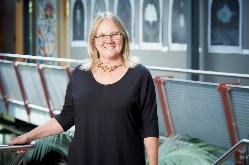Gifted Awareness Week takes place this year between 12 and 18 June. This special week aims to celebrate gifted people and the nature of giftedness.
Our guest blogger Ingrid Frengley-Vaipuna explains the importance of identifying giftedness and offers some suggestions as to how we can support gifted and talented students in our schools.
Who are gifted and talented students?
The stereotyping of gifted ākonga as the nerdy, weedy genius is totally inappropriate in our diverse classrooms. Giftedness and talent is found in every ethnic and socio economic group. Within a group of identified gifted and talented students there may be as many gifts and talents as there are students.
Schools are often challenged as they arrive at a definition of gifted and talented that reflects their context. Where this is a really positive and productive experience is when all stakeholders are involved - leaders, teachers, ākonga, parents, whanau and iwi. Sometimes this can be combined with creating an aspirational graduate profile.
It’s not just about academic performance or the talents that the teacher values. Different communities recognise and value different human attributes. For instance service is highly valued in Pasifika communities. Universal Design for Learning (UDL) principles apply here in that every student’s strengths and needs should be recognised and catered to.
Sometimes schools will opt out of catering specifically for gifted and talented ākonga by claiming all ākonga have gifts and talents. This may be true, but gifted and talented education focuses on the exceptional, the ones that stand out from their peers and need something different in order to thrive.
Dr. Françoys Gagné has developed a model that differentiates between giftedness and talent. He considers the top 10% in a domain of human ability (potential) or area of talent to be ‘gifted’ or ‘talented’.
Return to top
How can you support gifted and talented students at your school?
A broad, responsive, personalised curriculum allows a wide range of talent to surface and flourish.
Parents and whānau are a great source of information about ākonga interests and they may also have expertise to share in the school that the staff does not. While we are used to having parents and whānau involved in sporting and cultural activities there are many other areas where they may be able to inspire gifted and talented ākonga. Some schools have had parents run Future Problem Solving, Art club, Glee club, Philosophy club, Bone carving, Indian cooking - just to name a few.
Some primary schools run ‘passion hour’, clubs, or extra curricula activities to cater for students' talents and interests.
In secondary schools, whole day interdisciplinary courses and flexible timetabling are enabling senior ākonga to extend themselves beyond a traditional academic curriculum.
Acceleration can allow gifted and talented ākonga to be sufficiently challenged in their areas of strength. When students have completed the curriculum/qualification requirement they can investigate the myriad of on-line options, become involved in social action, or move into the next institution early. Ākonga who sit at stanine 9 on standardised testing need to be ‘above level’ tested to ascertain their actual capability and programmes should be adjusted accordingly.
Tuakana/teina relationships can also facilitate learning in specialist areas as well as support social and emotional growth.
Stage Challenge (or J rock for younger students) and school productions are a couple of my favourite activities to involve a range of talents from sound engineering, acting, costume design, building, sewing, and lighting through to dance.
Competitions hook in many intellectually gifted kids and sporting prowess is always well catered for and applauded in New Zealand. However, schools need to look beyond the classroom and the sports field to other possibilities for talent to flourish. Gifted and talented ākonga can have quite unusual interests - ask them.
Philosophy for children (P4C) training for teachers can improve thinking for all students but provide real stimulus and challenge for your gifted thinkers.
Future Problem Solving caters well for some gifted and talented ākonga either individually or in groups. New Zealand does very well in the international finals. Listen to problem solving champion Hannah Hudson’s Ted talk: Give our youth the gift of problem solving.
Return to top
Key messages for teachers and leaders
- There are gifted students in your school
- Gifted students are priority learners (because they come under the umbrella of special needs)
- In order to recognise them and provide appropriately for them you may need some targeted PLD
- Don’t create glass ceilings for them
- Look for the ‘hidden gifted’ - the disengaged, under achievers, twice/multi exceptional (gifted with a learning disorder)
- All teachers are teachers of gifted and talented ākonga.Z offers a range of ideas for celebrating Gifted Awareness Week for schools, teachers, teacher educators, parents, and families.
Supporting resources
Gifted and Talented Online
This site supports schools, teachers, students, and parents in assisting gifted and talented students to reach their full potential academically, emotionally, and socially.
SENG - Supporting the emotional needs of the gifted
SENG offers support and guidance to the gifted community, through education, research, and connection.

